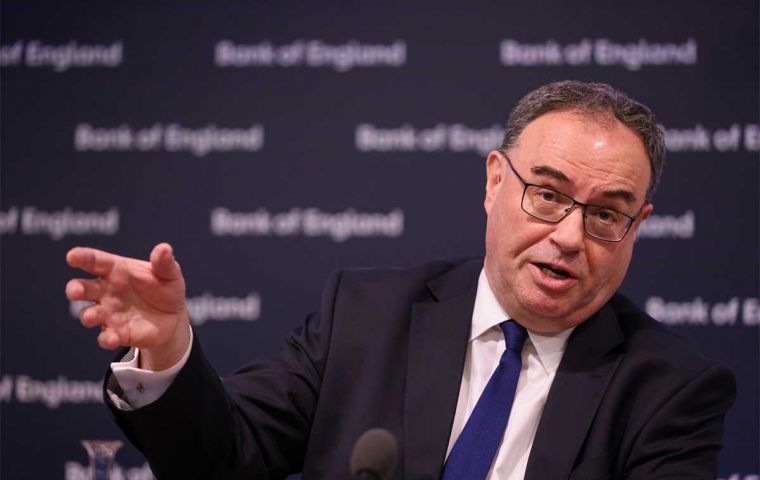MercoPress. South Atlantic News Agency
Bank of England cuts basic rate to 5% in divided vote; monetary policy will continue restrictive
 Andrew Bailey, Chair of the Bank of England, admitted that the fall in interest rates was “not mission accomplished yet”.
Andrew Bailey, Chair of the Bank of England, admitted that the fall in interest rates was “not mission accomplished yet”. The Bank of England Monetary Policy Committee, MPC at its meeting ending on 31 July 2024, voted by a majority of 5–4 to reduce Bank Rate by 0.25 percentage points, to 5%. Four members preferred to maintain Bank Rate at 5.25%.
MPC published an updated set of projections for activity and inflation in the accompanying August Monetary Policy Report. Twelve-month CPI inflation was at the MPC’s 2% target in both May and June. CPI inflation is expected to increase to around 2¾% in the second half of this year, as declines in energy prices last year fall out of the annual comparison.
This will reveal more clearly the prevailing persistence of domestic inflationary pressures. Private sector regular average weekly earnings growth has fallen to 5.6% in the three months to May, and services consumer price inflation has declined to 5.7% in June. GDP has picked up quite sharply so far this year, but underlying momentum appears weaker.
The Committee’s framework for assessing the medium-term outlook for inflation distinguishes between first and second-round effects. The MPC has been focused on second-round effects that capture more persistent inflationary pressures. The Committee continues to monitor the accumulation of evidence from a broad range of indicators.
The Committee expects the fall in headline inflation, and normalization in many indicators of inflation expectations, to continue to feed through to weaker pay and price-setting dynamics. A margin of slack should emerge in the economy as GDP falls below potential and the labor market eases further. Domestic inflationary persistence is expected to fade away over the next few years, owing to the restrictive stance of monetary policy.
In balancing these considerations, at this meeting, the Committee voted to reduce Bank Rate to 5%. It is now appropriate to reduce slightly the degree of policy restrictiveness. The impact from past external shocks has abated and there has been some progress in moderating risks of persistence in inflation. Although GDP has been stronger than expected, the restrictive stance of monetary policy continues to weigh on activity in the real economy, leading to a looser labor market and bearing down on inflationary pressures.
Monetary policy will need to continue to remain restrictive for sufficiently long until the risks to inflation returning sustainably to the 2% target in the medium term have dissipated further. The Committee continues to monitor closely the risks of inflation persistence and will decide the appropriate degree of monetary policy restrictiveness at each meeting.




Top Comments
Disclaimer & comment rulesCommenting for this story is now closed.
If you have a Facebook account, become a fan and comment on our Facebook Page!